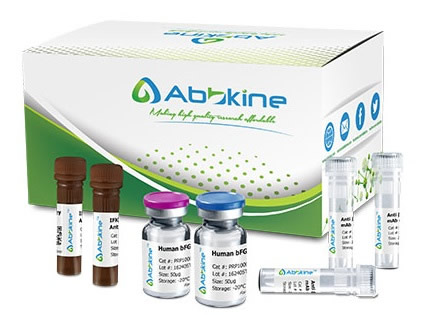Adrenomedullin (ADM) is a peptide associated with pheochromocytoma. Adrenomedullin (AM) is a ubiquitously expressed peptide initially isolated from phaechromyctoma. Adrenomedullin, a hypotensive peptide found in human pheochromocytoma, consists of 52 amino acids, has 1 intramolecular disulfide bond, and shows a slight homology with the calcitonin gene-related peptide. It may function as a hormone in circulation control because it is found in blood in a considerable concentration. The precursor, called preproadrenomedullin, is 185 amino acids long. By RNA-blot analysis, human adrenomedullin mRNA was found to be highly expressed in several tissues. The human AM gene is localized to a single locus on Chromosome 11 with 4 exons and 3 introns.
Bovine Adrenomedullin (ADM) ELISA Kit employs a two-site sandwich ELISA to quantitate ADM in samples. An antibody specific for ADM has been pre-coated onto a microplate. Standards and samples are pipetted into the wells and anyADM present is bound by the immobilized antibody. After removing any unbound substances, a biotin-conjugated antibody specific for ADM is added to the wells. After washing, Streptavidin conjugated Horseradish Peroxidase (HRP) is added to the wells. Following a wash to remove any unbound avidin-enzyme reagent, a substrate solution is added to the wells and color develops in proportion to the amount of ADM bound in the initial step. The color development is stopped and the intensity of the color is measured.
Bovine Adrenomedullin (ADM) ELISA Kit listed herein is for research use only and is not intended for use in human or clinical diagnosis. Suggested applications of our products are not recommendations to use our products in violation of any patent or as a license. We cannot be responsible for patent infringements or other violations that may occur with the use of this product.
bio-equip.cn




